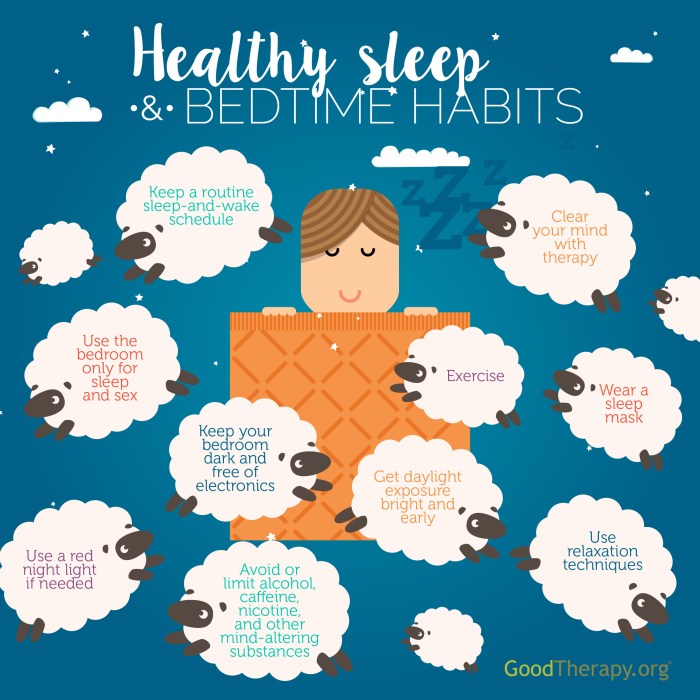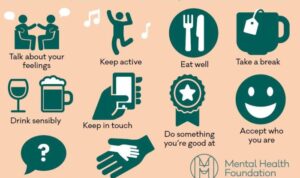Sleep hygiene is more than just cleanliness—it’s about creating habits and an environment conducive to quality rest. Dive into the key aspects of sleep hygiene for a rejuvenating night’s sleep.
From setting up a sleep-inducing environment to establishing a bedtime routine, this guide covers it all to help you improve your sleep quality.
Importance of Sleep Hygiene
Sleep hygiene refers to a set of practices and habits that promote good sleep quality and overall well-being. It is essential for maintaining optimal physical, mental, and emotional health.
Benefits of Maintaining Good Sleep Hygiene
- Improved concentration and productivity: Proper sleep hygiene enhances cognitive function, leading to better focus and performance in daily tasks.
- Enhanced mood and emotional well-being: Adequate sleep contributes to a positive mood and helps regulate emotions effectively.
- Stronger immune system: Quality sleep supports the immune system, reducing the risk of illnesses and infections.
- Healthy weight management: Good sleep hygiene plays a role in regulating hormones related to appetite and metabolism, aiding in weight control.
Impact of Poor Sleep Hygiene
- Increased risk of chronic diseases: Insufficient or poor-quality sleep is linked to various health conditions such as heart disease, diabetes, and obesity.
- Impaired cognitive function: Lack of proper sleep hygiene can result in memory problems, difficulty concentrating, and decreased cognitive performance.
- Mood disturbances: Inadequate sleep can lead to irritability, mood swings, anxiety, and depression.
- Daytime fatigue and decreased energy levels: Poor sleep hygiene may cause excessive daytime sleepiness, fatigue, and reduced motivation.
Creating a Sleep-Inducing Environment
To ensure a good night’s rest, it’s crucial to set up a sleep-inducing environment that promotes relaxation and comfort. By creating the ideal conditions for sleep, you can improve the quality of your rest and wake up feeling refreshed.
Ideal Sleep Environment Conditions
- Avoid exposure to bright lights before bedtime, as it can disrupt your body’s natural sleep-wake cycle. Consider using blackout curtains or a sleep mask to block out unwanted light.
- Keep noise levels to a minimum by using earplugs or a white noise machine if you live in a noisy area. Silence or soothing sounds can help you drift off more easily.
- Maintain a comfortable room temperature between 60-67 degrees Fahrenheit (15-19 degrees Celsius) to create a sleep-conducive environment. Being too hot or too cold can interfere with your ability to fall asleep.
Establishing a Bedtime Routine

Having a consistent bedtime routine is crucial for improving the quality of your sleep. By following a set schedule every night, you signal to your body that it’s time to wind down and prepare for rest. This can help regulate your internal clock and promote better sleep patterns.
Calming Activities for Bedtime Routine
- Reading a book: Engaging in a calming activity like reading can help relax your mind and reduce stress levels before bed.
- Meditation or deep breathing exercises: Practicing mindfulness techniques can help quiet the mind and promote relaxation, making it easier to fall asleep.
- Listening to soothing music: Playing soft, calming music can create a peaceful atmosphere and help you unwind before bedtime.
- Taking a warm bath: Soaking in a warm bath can help relax tense muscles and prepare your body for sleep.
Benefits of Winding Down Before Bed
- Improved sleep quality: By engaging in calming activities before bed, you can reduce anxiety and stress, leading to a more restful night’s sleep.
- Enhanced relaxation: Winding down before bed can help you transition from the busyness of the day to a more peaceful state, promoting relaxation and better sleep.
- Established routine: Having a bedtime routine can signal to your body that it’s time to sleep, making it easier to fall asleep and wake up at the same time each day.
Limiting Stimulants and Electronic Devices: Sleep Hygiene
When it comes to getting a good night’s sleep, it’s crucial to limit stimulants and electronic devices that can interfere with your rest. Let’s dive into how caffeine, nicotine, and screens can impact your sleep quality.
Effects of Stimulants
- Caffeine, found in coffee, tea, and some sodas, is a stimulant that can keep you awake and alert, making it harder to fall asleep.
- Nicotine, commonly found in cigarettes and vaping products, is another stimulant that can disrupt your sleep patterns, leading to fragmented sleep.
Tips for Reducing Stimulant Intake
- Avoid consuming caffeine and nicotine at least 4-6 hours before bedtime to allow your body to metabolize these substances.
- Consider switching to decaffeinated beverages or herbal teas in the evening to reduce the impact of caffeine on your sleep.
- Seek support or resources to help you quit smoking or vaping to improve your overall sleep hygiene.
Impact of Electronic Devices
- The blue light emitted by screens on electronic devices like smartphones, tablets, and computers can suppress melatonin production, making it harder to fall asleep.
- Engaging with stimulating content on electronic devices before bed can also lead to increased alertness, making it challenging to unwind and relax for sleep.
Strategies to Limit Screen Time Before Bed
- Establish a digital curfew by setting a specific time to power down electronic devices at least an hour before bedtime.
- Use blue light filters or apps that reduce the blue light emitted by screens to minimize its impact on your circadian rhythm.
- Engage in relaxing activities like reading a book, meditating, or taking a warm bath instead of scrolling through social media or watching TV before bed.
Maintaining a Healthy Lifestyle

When it comes to maintaining a healthy lifestyle, the connection between physical activity, diet, and sleep hygiene plays a crucial role in overall well-being. Making positive choices in these areas can significantly impact the quality of your sleep.
Incorporating Exercise and Healthy Eating Habits
Engaging in regular physical activity not only improves your overall health but also promotes better sleep. Aim for at least 30 minutes of moderate exercise most days of the week. Additionally, incorporating a balanced diet rich in fruits, vegetables, whole grains, and lean proteins can further enhance your sleep quality.
- Avoid heavy meals close to bedtime, as they can lead to discomfort and disrupt your sleep. Opt for lighter, nutrient-dense evening meals to support a restful night.
- Limit your alcohol intake, especially in the hours leading up to bedtime. While alcohol may initially make you feel drowsy, it can interfere with your sleep cycle and result in fragmented rest.
- Stay hydrated throughout the day, but try to reduce fluid intake close to bedtime to minimize disruptive trips to the bathroom during the night.
Dealing with Sleep Disorders
When it comes to sleep disorders, it’s essential to understand the common issues that can impact your sleep hygiene. These disorders can significantly affect your overall well-being and quality of life, making it crucial to address them effectively.
Common Sleep Disorders
- Insomnia: A common sleep disorder characterized by difficulty falling asleep or staying asleep, leading to inadequate rest and daytime fatigue.
- Sleep Apnea: A condition where breathing repeatedly stops and starts during sleep, causing disruptions in the sleep cycle and leading to poor sleep quality.
- Restless Legs Syndrome: An uncomfortable sensation in the legs that causes an irresistible urge to move them, often leading to difficulty falling asleep.
- Narcolepsy: A neurological disorder characterized by excessive daytime sleepiness, sudden sleep attacks, and a tendency to fall asleep at inappropriate times.
Seeking Professional Help, Sleep hygiene
It’s crucial to seek professional help if you suspect you have a sleep disorder. A healthcare provider can accurately diagnose the issue and recommend appropriate treatment options. Ignoring sleep disorders can have serious consequences on your health and well-being, so it’s important to take action and seek help.
Coping Strategies
- Establish a consistent sleep schedule and bedtime routine to promote better sleep habits.
- Create a relaxing sleep environment by keeping your bedroom dark, quiet, and at a comfortable temperature.
- Avoid stimulants like caffeine and electronics before bedtime to reduce disruptions in your sleep cycle.
- Practice relaxation techniques such as deep breathing or meditation to help calm your mind and body before sleep.
- Consider cognitive-behavioral therapy for insomnia (CBT-I) as an effective treatment option for improving sleep quality and managing sleep disorders.





